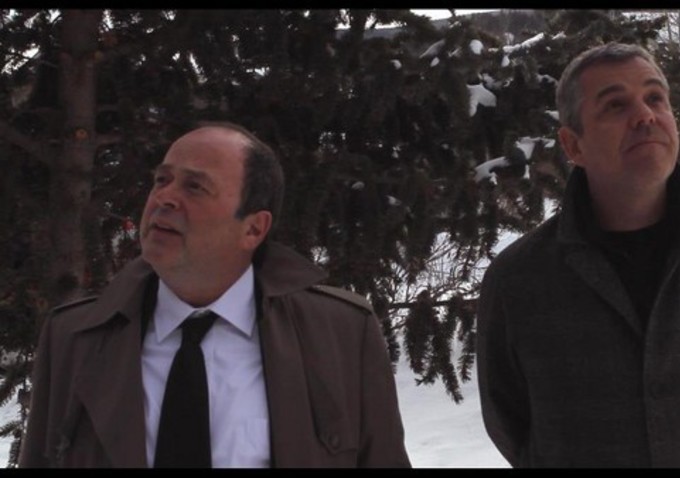
‘Boxing Day’
Transplanted Brit writer-director Bernard Rose and Hollywood scion Danny Huston have enjoyed a long and fruitful relationship. Casting Huston in “IVANSXTC,” a llittle-seen 2002 success d’estime that in many ways presaged the indie digital age, jumpstarted the would-be director’s career as an actor. Huston keeps coming back for more, because with Rose he winds up doing his best acting.
So far the two men have collaborated on four unfettered, unsupervised collaborations of micro-budget Leo Tolstoy adaptations, updated to modern LA. ”IVANSXTC” was the first (“The Death of Ivan Ilitch”), followed by relationship drama “The Kreutzer Sonata,” about a wealthy man who falls for a concert pianist, and the upcoming “Boxing Day” (“Master and Man”), produced by Luc Roeg’s Independent and the BFI, which world premieres in Venice this month in advance of a fall UK opening.
There’s also a fourth Tolstoy film in the can, “Two Jacks” (“Two Hussars”), which will eventually turn up on the festival circuit (trailer below). “It’s very different, light-hearted and nostalgic and sweet,” says Rose, who toys with the Huston legend in this one, casting Danny as womanizing film director and gambler Jack Hussar, who comes to LA to raise financing for his next film, seduces Diana (Sienna Miller) and plays a high-stakes poker game. Years later, Hussar Jr. (Danny’s nephew Jack, “Boardwalk Empire”) arrives in Hollywood to make his directorial debut, while the older Diana (Jacqueline Bisset) realizes that her daughter is falling for her former lover’s son.
Rose, who scores his films with his own classical piano interpretations, also has a penchant for music movies, from biopic “Immortal Beloved,” starring Gary Oldman as Ludwig von Beethoven, to the upcoming “Paganini – The Devil’s Violinist,” which stars violinist David Garrett and begins filming this month in Germany and Austria.
“Boxing Day,” a two-hander about a wealthy real estate speculator and his driver, is close to the Tolstoy original about an entitled man making property deals in turn-of-the-19th century Russia accompanied by his resentful serf. This movie features yet another powerful man in the throes of anxiety. “Tolstoy’s work is always kind of autobiographical,” says Rose. “All the central characters of his books are versions of Tolstoy: Levin, Pierre, Anna Karenina and Ivan share a common thread, they go through violent emotions. Tolstoy had all these emotions in him. There’s a similarity to his lead characters because they’re all versions of him. In that sense, across these films, casting Danny in that role emphasizes that they’re all aspects of the same person.”
Rose has watched Huston mature as an actor over the four films. At the start, he wasn’t a working actor, he says: “Danny was a close personal friend I’d hang out with. He always seemed to behave like a movie star, whether or not he was one. He had presence in the room, he was larger than life, had an actor’s charisma. Acting has a skill and talent element to it, but there’s also a strong personality component. You like actors who are compelling as human beings. Brando was a brilliant actor, but that’s not why he was compelling. You had no idea what was going to come out of his mouth next, he was fascinating to watch.”
Huston has something beyond personality: “He has a way of engaging you so when he tells a story, you listen to what he says.” When they were planning “IVANSXTC,” Huston was eager to make his mark as a film director, but wasn’t getting anywhere. Rose had been wanting to update the Tolstoy story ever since he directed 1997′s “Anna Karenina,” he says: “It struck me powerfully as a potent encapsulation and parable of the central existential problem of human beings.”
Knowing that no one would back this downbeat uncommercial subject, Rose decided to “go make the film without asking for permission. There was something glorious about it.” He shot “IVANSXTC” in 1999 with the original Sony HDcam: he thinks it was the first film shot in an HD format, which was radical at the time. “Now it’s become common.” Alas, the DVD is only available in the UK.
With “Boxing Day,” it was also unlikely that anyone would “want to finance a film about two middle-aged men in a car,” says Rose. “It’s not going to make a producer salivate.” So Rose drove with a crew of six people to Colorado and shot the film. “There’s nothing official about any of it,” he says. “It’s so liberating. I’ve made bigger movies before and since, but when you are involved in that whole industrial process, there are things you can’t do.”
“Boxing Day” starts the day after Christmas as Danny Huston’s real estate speculator sits on his balcony, watching the sun rise. Soon he has ditched his snug California hearth for a thankless trek into the dark Colorado winter in a Mercedes with a driver (“Paperhouse” writer Matthew Jacobs), who also doesn’t have his head screwed on tight; he’s turned away when he tries to visit his ex-wife and kid. Each man could blow a gasket at any minute. Sure enough, they get themselves into serious trouble.
Both men are anxious, broke and desperate, and get on each other’s nerves after hours of winter driving, one in front, the other in back, to sad foreclosed homes. But the movie is entertaining, as they alternately loathe and amuse each other. The camera captures every close-up nuance, each slow burn. “I know,” says Rose. “It’s nice to have the time to see somebody thinking. One of the things I can’t stand is having to cut so fast, it’s incredibly boring when pace is so uniform that you can’t get involved.”
Rose drove to the Colorado mountains with two cars and six people: his line producer, assistant, cameraman and 7D camera, sound recordist, and two actors. The weather was very cold, below zero. “It was unbelievable, minus 18 at night in the car,” he says. “The actors were very cold. When it’s that cold you can’t see water vapor: it’s frozen. Breathing hurts your lungs. We were foolhardy, slightly stupid, and drove up the middle of a road to nowhere, it was black everywhere, no cell phone signal, the vehicle really was stuck on ice with the wheels spinning.” Luckily 7D works in minus 18 Fahrenheit.
The truth of digital production is that it costs a lot less to shoot something like this ($10-20,000) than it does to finish it (about $110,000). “Completing films and delivering the elements is a considerable amount,”says Rose. “Luckily, the BFI picked up the cost of making a film look like a movie.”
Somehow Rose, who directed “Candyman,” also found time to indulge his love of horror with sexual ghost story “Sx_Tape,” about a couple who shoot a sex tape in an old house and find that they are not alone. It’s in post-production.
“Paganini: The Devil’s Violinist” is a much bigger production: funded with subsidy money in Germany, the $10 million 19th century period biopic is produced by Gabriela Bacher (“What a Man”), Rosilyn Heller (“Trade”) and Christian Angermayer of Film House Germany and stars German violinist David Garrett, Joely Richardson and Jared Harris. “Garrett can pull this off,” says Rose. “It’s far worse to have an actor miming the violin.” No more cold cramped conditions, as Rose shoots in deluxe sets in Vienna, Munich and Northern Italy: “It’s my homage to Ken Russell, a full-blown epic.”
View Article